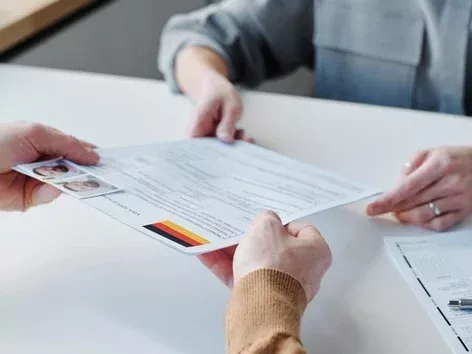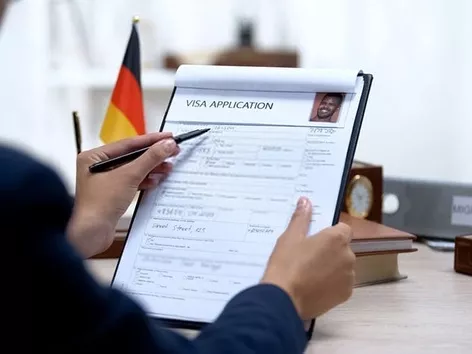Work in Germany in 2025: work visa, vacancies and changes in migration legislation

In 2025, Germany introduced visa reforms to attract talent from around the world, as the country faces a severe labor shortage. In particular, during this year the country planned to issue 400,000 work visas. Find out what changes to migration legislation await foreigners in Germany in 2025, which positions are better for expats to get a job and the current procedure for obtaining a work visa
Thanks to its strong economy and high standard of living, Germany is one of the most attractive countries for migrant workers from various countries: Armenia, Turkmenistan, Albania, Georgia, etc. The country actively attracts foreign workers, in particular highly qualified specialists. If you have a higher education and are fluent in German, you have excellent employment opportunities in the fields of programming, IT, medicine, engineering or science.
One of the main advantages of working in Germany is that the country offers ample opportunities for professional and personal development, as well as stable working conditions and a high level of social protection for employees.
Read on to learn more about the features of employment in Germany in 2025.
Key updates on obtaining a work visa in Germany in 2025
In 2025, Germany significantly changed its migration policy to attract international talent and improve the employment process, including the following changes in the country:
1. Revised salary thresholds for job offers.
Starting from 2025, job offers in Germany must guarantee an expat an annual salary of at least €43,470.
If employers have collective agreements, then compliance with the wage standards stipulated in the agreements will be sufficient.
The main goal of these changes is to make it easier for qualified professionals to move.
2. A simpler procedure for obtaining a Blue Card.
In particular, foreigners who have completed their studies within the last three years and have found a job where the employer offers a minimum salary of 45.3% of the annual pension insurance ceiling (EUR 43,759.80 in 2025) can now obtain a Blue Card. This applies to both regular and shortage professions.
The salary threshold for other workers has also been changed: for shortage professions and new entrants to the labor market, it is set at 45.3% (EUR 43,759.80). For other professions, this figure is 50% (EUR 48,300).
3. Simplified access to the labor market for IT professionals.
- The work experience requirement has been reduced from three to two years.
- Academic or non-academic professional qualifications are no longer required.
- Knowledge of German is no longer mandatory for obtaining a visa.
- Annual salary of at least 43,470 euros or the collective bargaining agreement remuneration applies.
4. The integration period for highly qualified workers has been extended.
Germany has increased the period of adaptation measures from 18 to 24 months with the possibility of an extension of 12 months, allowing a maximum stay of three years.
5. Increased employment opportunities during qualification.
Future qualified workers can now do secondary work for up to 20 hours per week, doubling the previous allowance.
The most popular jobs for foreigners in 2025
Key sectors such as transportation, manufacturing, construction, healthcare, engineering and IT are facing acute labor shortages, creating ample opportunities for qualified foreign workers:
- Healthcare – doctors, nurses, elderly care assistants.
- Engineering – mechanical, electrical and civil engineers.
- IT and software – programmers, cybersecurity specialists, artificial intelligence experts.
- Logistics – truck drivers, warehouse managers, supply chain experts.
- Education – kindergarten and primary school teachers.
- Skilled trades – electricians, plumbers, construction workers.
To move, travel or work safely in a new country, you will need health insurance. You can apply for an extended policy on our website here.
Types of German long-term work visas
- Citizens of the European Union, the European Economic Area and the European Free Trade Association can work in Germany without a German visa. Applicants from Australia, Canada, Israel, Japan, New Zealand, the USA, South Korea and the UK can also apply for a temporary residence permit upon arrival in Germany without the need for visa procedures in their home country. To enter Germany, such persons only need a passport.
- Representatives of the rest of the world must have a visa to enter Germany, the most popular permits are:
1. General work visa for Germany
Persons planning to apply for a general work visa for Germany must meet two key conditions: have professional and technical qualifications in a specific field and have a specific offer from the employer in the employment contract. These conditions are important for obtaining a visa, as they confirm that the person has the necessary skills and a valid employment contract in Germany.
2. Special work visa to Germany
Germany has introduced special visas for qualified specialists who wish to work and reside in the country. This type of visa covers graduates with special skills, university lecturers with outstanding experience and experienced managers with a job offer with a salary of 86,400 euros per year.
The main requirement for applicants is to have sufficient funds to maintain and confirm the employment contract. According to the requirements of the European Commission, a foreign applicant must prove that they have 45 euros per day during their stay in Germany. This can be confirmed by personal financial statements for the last three months, a deposit account statement, written confirmation from parents or sponsors about covering expenses, along with documents confirming their financial capacity.
3. Self-employed visa in Germany
A self-employed visa in Germany allows you to work as a freelancer or start your own business in the country. To obtain this type of visa, you must have sufficient funds to support yourself and your activities. The application procedure is similar to other types of visas, with mandatory confirmation of the benefit of your work for Germany.
A package of documents for obtaining a work visa to Germany
1. A letter of intent or a contract offered to you by a German company containing a detailed job description.
2. Confirmation of the necessary professional qualifications.
3. Documents confirming professional knowledge and experience: resume, references from previous employers, higher education diplomas, certificates, etc.
4. Health insurance for foreign workers in Germany.
Usually, two copies are required for each original document, so make sure you have photocopies of all documents.
Portals for finding a job in Germany
The official Internet portal of the Federal Employment Agency of Germany publishes more than 800 thousand different vacancies from all the states of the country every month.
Local job search sites are also available for finding a job in Germany. The following are quite popular:
1. JobLeads: offers vacancies in Germany with a salary of more than 50 thousand euros per year.
2. Experteer: a source of vacancies for specialists who seek a salary of 60 to 120 thousand euros per year.
3. Absolventa: specializes in vacancies for students, graduates and young professionals.
4. HotelJob: work in the hotel business.
5. GastroJobs: work in restaurants and cafes.
There are really a lot of vacancies in Germany in different fields and at different salary levels. If you decide to work in Germany, you will definitely be able to find a job according to your diploma, skills and experience if you speak German. Even if knowledge of German is not required for a particular position, you will find a job where this language is not a requirement.
Employment in Germany in 2025: Important Tips
- CV
One of the mandatory documents is a CV (Lebenslauf) with your photo. The photo should look cheerful, as even highly qualified specialists in Germany pay attention to this aspect. The CV must indicate the dates of graduation from educational institutions, places of work with a description of responsibilities, marital status and level of language proficiency. Other details can be added at your own discretion. It is optimal that the CV can fit on one sheet of A4 format.
- Resume (Bewerbung)
If you speak German and have sufficient experience, it is recommended to write a resume yourself based on templates. You should attach copies of diplomas, certificates, confirmation of qualifications and a translation of your work record. Do not forget about your school certificate - its translation should be mandatory, since Germany uses a reverse grading system. Germans are very interested in your education from childhood.
- Employer testimonials
Add testimonials from employers and teachers to your documents, if they are positive.
Important! Germans prefer the traditional approach and prefer to receive documents in paper form via mail. This is important to remember when sending CVs and other documents. If possible, documents should be sent in paper format, formatted clearly and neatly.
With a simpler visa application process, expanded quotas and relaxed immigration rules, 2025 represents one of the best opportunities for foreign specialists to build their careers in Germany.
Book a consultation with an employment lawyer to get detailed information on obtaining a German work visa and understand all the intricacies of applying for a visa and preparing a resume!
Reminder! From January 1, 2025, Germany has launched a revolutionary online portal that significantly simplifies the visa application process. Thanks to the new platform, applicants from anywhere in the world will be able to apply for a tourist, student or work visa digitally. We have already told you what is already known about the portal for consular services in Germany.
Products from Visit World for a comfortable trip:
Checklist for obtaining a visa and necessary documents in Germany;
Legal advice on business issues in Germany;
Travel insurance for foreigners in Germany;
Medical insurance around the world.
We monitor the accuracy and relevance of our information, so if you notice any errors or inconsistencies, please contact our hotline.
Frequantly
asked questions
What will be the salary in Germany in 2025?
What is the best job in Germany for the future?
Which city in Germany has the most job opportunities?
Recommended articles
2 min
Employment
Chancenkarte in Germany: visa for highly skilled workers
Since June 2024, the so-called Chancenkarte (Opportunity Card) has been operating in Germany, which provides qualified specialists with the opportunity to obtain a residence permit for the purpose of finding a job. Learn more about the features and conditions for obtaining a Chancenkarte visa in Germany
08 Jun. 2024
More details2 min
Work
Termination of an employment contract in Germany: when and how can an employer fire you?
Germany attracts expats with career growth prospects and a high standard of living. However, when planning employment in another country, it is necessary to study the local legislation in detail. Understanding the procedure for terminating an employment contract is an important stage of work. Find out under what circumstances you can be fired by your German employer and how it happens
24 Jul. 2024
More details2 min
Work
Cost of living in Germany: expenses for housing rent, food, transport and monthly budget
Germany is one of the key countries of the European Union, which can guarantee a high standard of living not only for its citizens, but also for expats and migrants. Germany is chosen for temporary or permanent relocation, because it has a strong economy, developed infrastructure, rich culture and stability. Find out how much it costs to live in Germany in 2024-2025
05 Nov. 2024
More details1 min
Work
Job seeker visa Germany: what kind of permit is it, how to get a visa and a package of documents
Germany is a European country with the strongest economy in the region and a developed social sphere. Many foreigners dream of living and working in this country, but to move you need to get a visa. One of the available types of permits is a job seeker visa. Find out who can get this type of visa and how to apply for a German job seeker visa
27 Jan. 2025
More detailsAll materials and articles are owned by VisitWorld.Today and are protected by international intellectual property regulations. When using materials, approval from VisitWorld.Today is required.
